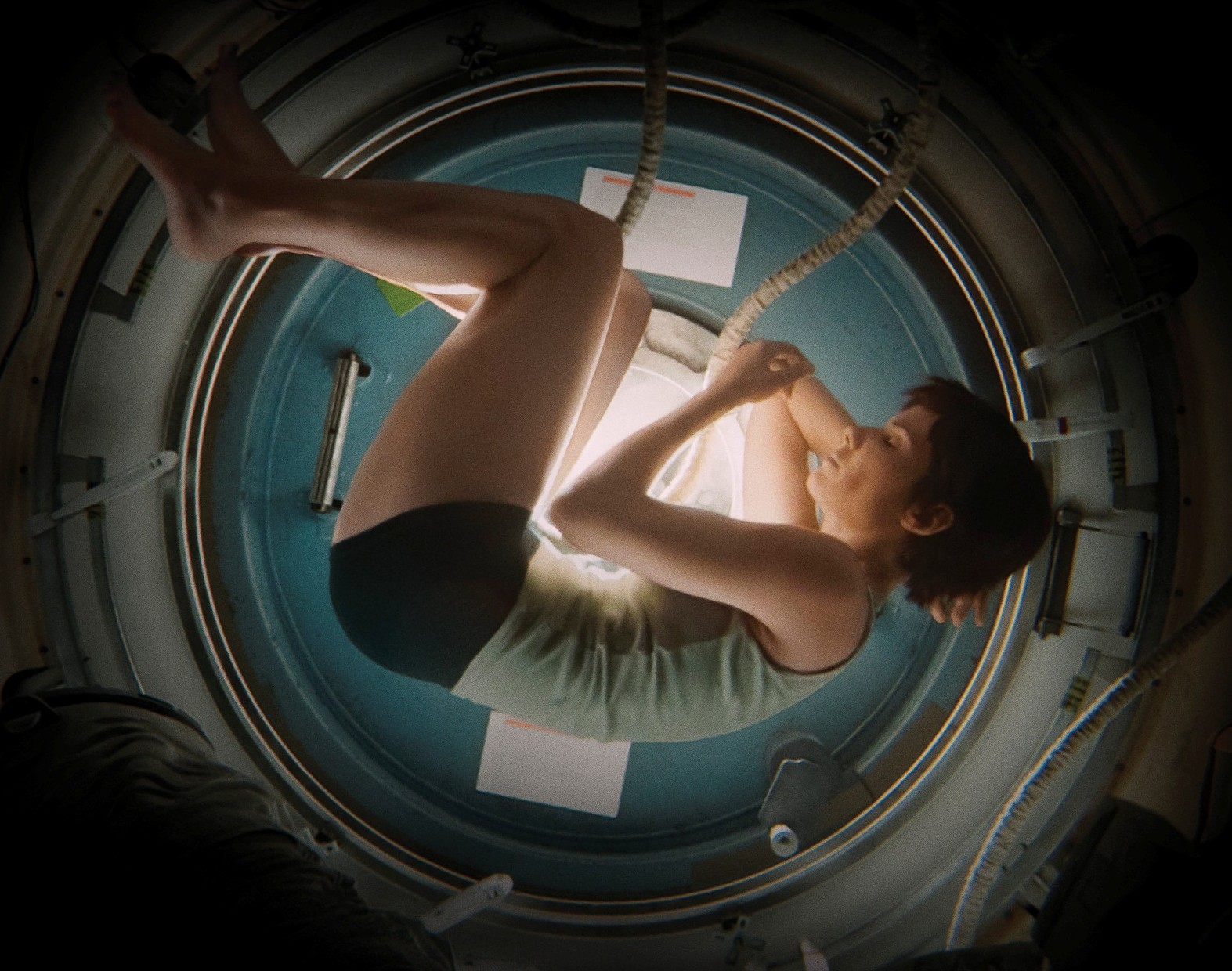
MPAA Rating: PG-13 | Rating: ★★★★★
Release year: 2013
Genre: Sci-Fi, Thriller Director: Cuaron
Life is impossible in space.
These are the opening words of Gravity. Those words set a subtle tone of dread as the beauty of the globe fills the screen. Blues and whites and greens and greys, swirling and spinning through space in a beautiful dance. “Awestruck” doesn’t quite capture the weight of the emotion; it is simply stunning to see the Earth from the perspective of space (and on an IMAX screen in 3D, no less). This balance between dread and awe weaves its way throughout Gravity, walking a tight emotional line between tension and wonderment. The camera floats along in space, until a white dot becomes more and more clear–a shuttle, with people around it.
Gravity has a simple story: Two astronauts, Ryan Stone (Sandra Bullock) and Matt Kowalski (George Clooney), cling to life and hope to survive after their shuttle gets hit with space debris from destroyed satellites. There is a bit of the thriller formula of “yet ANOTHER bad thing happens!” that leaves them scrambling desperately for survival. Yet Gravity is far from a typical thriller due to its incredible cinematography and ability to make small moments into profound–dare I say, weighty–scenes of significance, even transcendence.
Filmmaker Alfonso Cuaron (Children of Men) and cinematographer Emmanuel Lubezki (The Tree of Life) direct the camera in such a way that it envelopes the audience, bringing them right into outer space. Seeing the film in 3D IMAX felt like being right in the middle of the story, dodging space debris and feeling the sense of weightlessness as the astronauts hover above the earth. For 90 minutes, I was transported into another world. Cuaron is keen on long-takes, uninterrupted shots that seem to go on for many minutes at a time, uncut, making the experience feel even more real as the perspective remains the same. In a culture of immediacy and rapid-fire editing, Cuaron and Lubezki’s quietly hovering camera captures wonders that others would leave on the editing floor. Cuaron also gives generous hat tips to previous science-fiction giants, most notably 2001: A Space Odyssey. Yet the strongest filmic parallel I can make is with The Tree of Life, a masterpiece on the immense beauty and wonder of God’s creation, punctuated with the intimate story of ordinary people trying to make sense of it all.
“Gravitas“ means weightiness, seriousness, profundity. This is more than a survival story, more than a space thriller. Gravity is a meditation on the very essence of life, i.e. what keeps us breathing and moving and continually taking steps into the future. Stone has lost someone dear to her, and the thought that no one is looking up into the sky and praying for her seems to give a sense of hopelessness. In the weightlessness of space, it is quiet. Peaceful. Restful. Yet space also reminds us of this: we as human beings can feel terrifyingly alone and small. Staring into the abyss of infinite stars, one begins to wonder:why do I matter? What difference do I even make? When amazing technology like telescopes, shuttles, and space stations can be destroyed in the blink of an eye–a life’s opus, brushed away by debris–what then? When our child dies, our marriage falls apart, our job is lost, our security is taken or abused, what keeps us going? How do we know that we’re not alone?
Throughout Gravity, Kowalski and Stone keep sending out transmissions into the void of space, hoping someone is listening. “Houston in the blind….” is a common call, a longing to connect to someone. They talk, share stories, cry, scream, sending it all out into space in the hopes that they are not alone, that help is on the way. There is a beautiful moment where Stone weeps inside a space craft, pouring out her fears and doubts as tears float away from her eyes like prayers. She wonders aloud if she can pray, frustrated that no one taught her how. As she wept, I thought, “you’re doing fine. Keep praying.” These transmissions into space are prayers: wondering aloud if we’re alone, crying out into the night sky for help from someone beyond us, someone we cannot see and don’t know for sure if they hear, but we cry to them all the same. The Spirit does hear us, picking up on those transmissions, and offers us comfort and rest even though we cannot see Him.
At one point, Stone enters the International Space Station and peels off the thick layers of space suit and oxygen tanks and falls asleep, weightless with oxygen cords hovering about her, curling up quietly like a fetus in the womb, the bright sun rising over the horizon of the blue earth shining through the porthole. By the end of Gravity, she is born anew, spilling out through waters into new birth, new life, a quiet “thank you” prayed to the Spirit who hears us, no matter where in the universe our life leads.
Where can I go from your Spirit?
Where can I flee from your presence?
If I go up to the heavens, you are there;
If I make my bed in the depths, you are there.
If I rise on the wings of the dawn,
If I settle on the far side of the sea,
Even there your hand will guide me,
Your right hand will hold me fast.
(Psalm 139:7-10)
IMDB Listing: http://www.imdb.com/title/tt1454468/